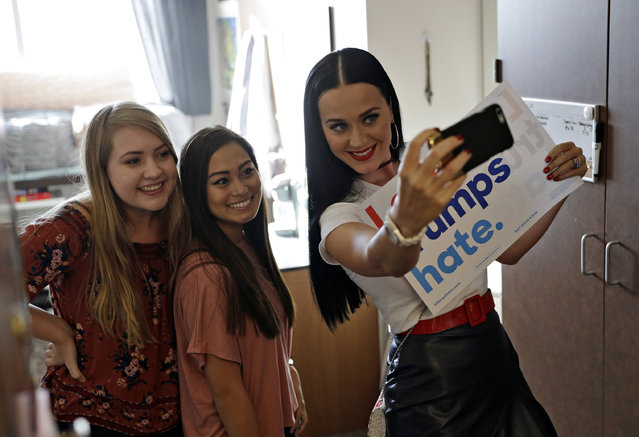The Importance Of The Undecided Voter In The U.S. Polls

NEW DELHI: With just two weeks left till United States voters hit the polls, Democrat Presidential candidate Hillary Clinton seems to have secured a lead. Polls almost all show Clinton ahead of rival Republican candidate Donald Trump, by an average of 7 points nationally. The three Presidential Debates and the sexual harassment allegations that have dogged Trump recently have been the key developments in favour of the Clinton campaign, seeing Clinton’s lead going from about 2 points before the first debate to a 7 point lead nationally.
Polls suggest that more than 90 percent of voters have made up their mind, but there still exist about 5 to 8 percent of eligible voters who are undecided when it comes to choosing between Trump and Clinton. In an election where Clinton’s lead has swung significantly -- to the extent that she was tied with Trump at 44.3 percent on July 29, the day after the Democratic National Convention -- the undecided voter matters more than ever.
The undecided voter, that is those who tell pollsters that they still do not know who they will vote for, tend to be younger than older. They are less likely to identify with either of the two parties and they tend to dislike both major party candidates. “It’s like asking me to choose between a heart attack and a stroke,” said one of the 27 voters selected and paid to participate in a focus group conducted by Republican pollster Frank Luntz in Philadelphia recently.
Undecided voters are a feature in every election, but what is different in this election is their highly unfavourable view of both candidates. In 2016, younger voters are more likely to be undecided, with a Fox News poll showing that one in five voters under age 35 said they wouldn’t choose between either candidate, as opposed to just 12 percent of voters aged 35 to 54. This is bad news for Clinton, as polls show that although she is in the lead amongst the under 35 age group, younger voters are not lining up behind her the way they did for Barack Obama, and are therefore cutting into her lead. The Bernie Sanders phenomenon has something to do with the above statistics, as younger voters rallied behind the Vermont senator, with a July survey having shown that nearly twice as many voters aged 18-29 viewed Clinton unfavorably (60 percent) as compared to those with a favourable view of her (31 percent).
A CBS poll corroborates that fact that both presidential candidates remain unpopular with the undecided voter. Only 5 percent of those undecided viewed Clinton favourably, with the number even worse for Trump at 3 percent.
Yet, the undecided voter could change things if they rally behind one candidate, with Clinton standing the most to gain or lose because these voters cut into her lead. This perhaps explains why the Clinton campaign has consistently tried to woo the undecided voter, pulling in celebrity endorsements to appeal to this vote base. The latest such endorsement came from talk show host and celebrity Oprah Winfrey. “There really is no choice people, all the people who sit around saying they can't decide,” the media mogul said on The T.D Jakes Show. “Here’s what I want to say: I hear these conversations all the time where people say, ‘I just don’t know if I like her’.“She’s not coming over [to] your house, you don’t have to like her. Do you like this country? You better get out there and vote […] Do you like freedom and liberty? Do you like democracy or do you want a demagogue? Ok, there you go,” she said, without mentioning Trump specifically.
In fact, Clinton’s deliberate choice to pull in celebrities fits in with this larger plan of targeting millennials -- many of whom make up the “undecided” demographic. Whilst Clinton has always had her fair share of celebrity endorsements -- Lena Dunham and singer Demi Lovato have appeared on the campaign trail for her earlier this cycle -- the last few weeks have seen an added push. A number of singers will perform for Clinton’s “Love Trumps Hate” campaign, including Jon Bon Jovi, Jennifer Lopez, The National, and Katy Perry. The campaign is also set to organise a media call with actress Salma Hayek. Last week, singer and actress Miley Cyrus (formerly a Bernie Sanders supporter) visited George Mason University in Virginia campaigning for Clinton. Katy Perry visited the University of Nevada Las Vegas for Clinton.
While the campaign’s bid to appeal to millennials has worked to some extent, the question pertaining to which way the remaining number of undecided voters will go, remains to be seen.



